VW ID.3 VS Nissan Leaf – Specs, Efficiency & Price Comparison
Which model is the better choice – the VW ID.3 or the Nissan Leaf? We compare performance (326 HP vs 217 HP), boot capacity (385 L vs 394 L), efficiency (14.50 kWh vs 16.70 kWh), and of course, the price (28600 £ vs 30800 £).
Find out now which car fits your needs better!
The VW ID.3 (Hatchback) is powered by a Electric engine and comes with a Automatic transmission. In comparison, the Nissan Leaf (Hatchback) features a Electric engine and a Automatic gearbox.
When it comes to boot capacity, the VW ID.3 offers 385 L, while the Nissan Leaf provides 394 L – depending on what matters most to you. If you’re looking for more power, you’ll need to decide whether the 326 HP of the VW ID.3 or the 217 HP of the Nissan Leaf suits your needs better.
There are also differences in efficiency: 14.50 kWh vs 16.70 kWh. In terms of price, the VW ID.3 starts at 28600 £, while the Nissan Leaf is available from 30800 £.
Compare all the key specs now and find out which model fits your lifestyle best!
VW ID.3
The VW ID.3 represents Volkswagen's entry into the world of electric vehicles, offering a modern design that combines functionality with sustainability. Inside, you'll find a spacious and tech-forward interior, providing a comfortable driving experience while maintaining a focus on environmentally friendly materials. The ID.3's performance delivers a smooth and responsive feel on the road, making it a strong contender in the growing electric car market.
details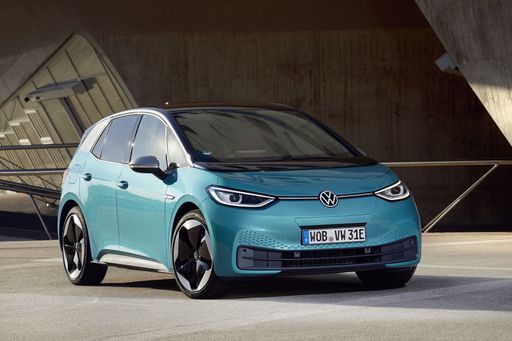 @ Volkswagen
@ Volkswagen
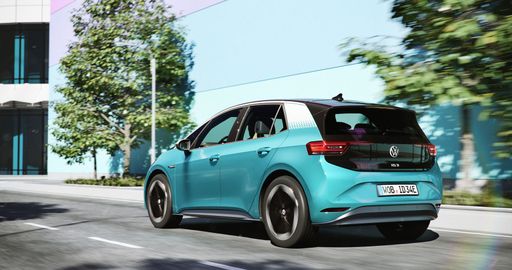 @ Volkswagen
@ Volkswagen
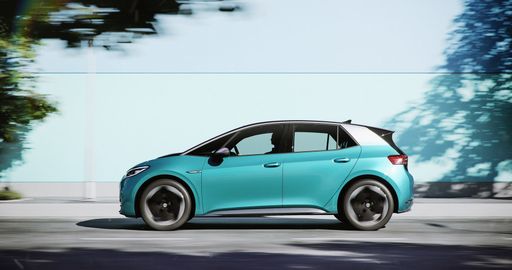 @ Volkswagen
@ Volkswagen
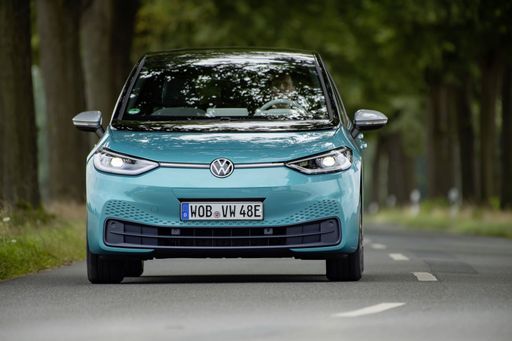 @ Volkswagen
@ Volkswagen
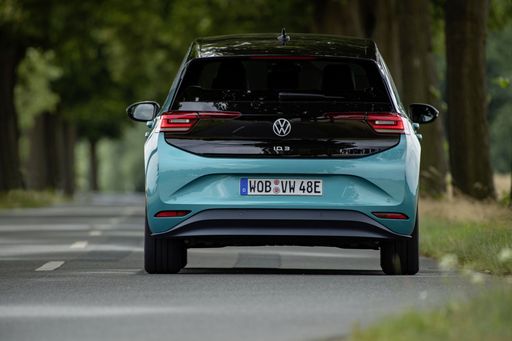 @ Volkswagen
@ Volkswagen
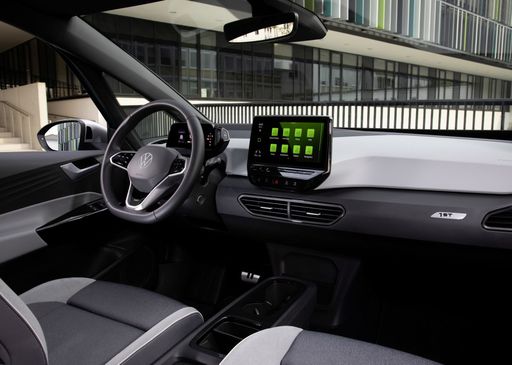 @ Volkswagen
@ Volkswagen
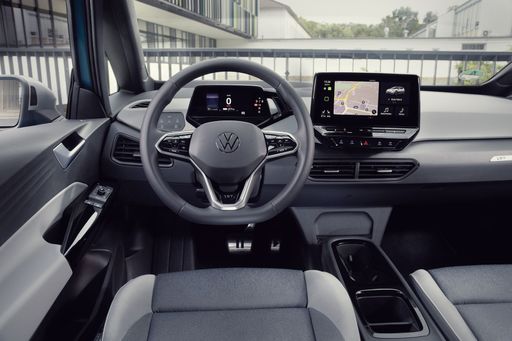 @ Volkswagen
@ Volkswagen
Nissan Leaf
The Nissan Leaf stands out as a pioneering model in the realm of electric vehicles, known for its impressive blend of practicality and eco-friendliness. It offers a smooth and quiet driving experience, making it an ideal choice for city commuting and longer journeys alike. The interior design is both comfortable and intuitive, providing drivers with a sense of modernity and ease of use.
details @ germany.nissannews.com
@ germany.nissannews.com
 @ germany.nissannews.com
@ germany.nissannews.com
 @ germany.nissannews.com
@ germany.nissannews.com
 @ germany.nissannews.com
@ germany.nissannews.com

|

|
|
|
|
Costs and Consumption |
|
|---|---|
|
Price
28600 - 41800 £
|
Price
30800 - 37200 £
|
|
Consumption L/100km
-
|
Consumption L/100km
-
|
|
Consumption kWh/100km
14.5 - 15.8 kWh
|
Consumption kWh/100km
16.7 - 17.8 kWh
|
|
Electric Range
383 - 606 km
|
Electric Range
270 - 385 km
|
|
Battery Capacity
52 - 79 kWh
|
Battery Capacity
39 - 59 kWh
|
|
co2
0 g/km
|
co2
0 g/km
|
|
Fuel tank capacity
-
|
Fuel tank capacity
-
|
Dimensions and Body |
|
|---|---|
|
Body Type
Hatchback
|
Body Type
Hatchback
|
|
Seats
5
|
Seats
5
|
|
Doors
5
|
Doors
5
|
|
Curb weight
1787 - 2000 kg
|
Curb weight
1580 - 1756 kg
|
|
Trunk capacity
385 L
|
Trunk capacity
385 - 394 L
|
|
Length
4264 mm
|
Length
4490 mm
|
|
Width
1809 mm
|
Width
1788 mm
|
|
Height
1564 mm
|
Height
1540 - 1545 mm
|
|
Payload
430 - 473 kg
|
Payload
384 - 415 kg
|
Engine and Performance |
|
|---|---|
|
Engine Type
Electric
|
Engine Type
Electric
|
|
Transmission
Automatic
|
Transmission
Automatic
|
|
Transmission Detail
-
|
Transmission Detail
Reduction Gearbox
|
|
Drive Type
Rear-Wheel Drive
|
Drive Type
Front-Wheel Drive
|
|
Power HP
170 - 326 HP
|
Power HP
150 - 217 HP
|
|
Acceleration 0-100km/h
5.7 - 8.2 s
|
Acceleration 0-100km/h
6.9 - 7.9 s
|
|
Max Speed
160 - 200 km/h
|
Max Speed
144 - 157 km/h
|
|
Torque
310 - 545 Nm
|
Torque
320 - 340 Nm
|
|
Number of Cylinders
-
|
Number of Cylinders
-
|
|
Power kW
125 - 240 kW
|
Power kW
110 - 160 kW
|
|
Engine capacity
-
|
Engine capacity
-
|
General |
|
|---|---|
|
Model Year
2024
|
Model Year
2019
|
|
CO2 Efficiency Class
A
|
CO2 Efficiency Class
A
|
|
Brand
VW
|
Brand
Nissan
|
VW ID.3
Introducing the VW ID.3: A New Age of Electric Driving
In the ever-evolving world of electric vehicles, Volkswagen stands as a beacon of innovation and sustainability. The VW ID.3 is the marque’s answer to a cleaner future, presenting a stylish and practical hatchback that captivates the eco-conscious yet demanding motorist. With variations that cater to diverse preferences, the ID.3 sets a new standard in the electric vehicle segment.
Performance & Efficiency: Pure Electric Power
The VW ID.3 offers a dynamic blend of performance and efficiency with power ranging from 170 to 326 PS. This is translated into on-road finesse by its automatic gearbox and rear-wheel drive configuration. Drivers can expect an impressive range between 383 to 604 km on a single charge, thanks to the vehicle’s efficient energy consumption which sits between 14.5 to 15.8 kWh/100km. Catering to various driving styles, it delivers acceleration from 0 to 100 km/h in just 5.7 to 8.2 seconds, all while maintaining zero emissions on the road.
Innovative Technology: Beyond the Basics
Volkswagen has embedded advanced technological features into the ID.3 to enhance user experience. The vehicle boasts a reduction gearbox designed for peak efficiency and seamless driving. It also comes equipped with the latest infotainment systems, a digital cockpit and safety features that elevate both convenience and security to new heights.
Design & Comfort: Spacious and Sleek
With a length of 4264 mm and a width of 1809 mm, the VW ID.3 comfortably accommodates five passengers while offering a generous 385-litre boot capacity. The sleek, streamlined silhouette is complemented by a spacious interior design prioritizing both comfort and sophistication. Crafted for the modern driver, the ID.3 offers features like adaptive ambient lighting and adjustable seating, ensuring a journey as pleasant as the destination.
Environmental Impact: Driving Towards Zero Emissions
Aligned with the target of reducing carbon footprints, the ID.3 performs strongly with a CO2 emission rating of 0 g/km, holding a proud A-class CO2 efficiency rating. By embracing sustainable materials and methods, Volkswagen reduces the life-cycle emissions of the ID.3, making it a hallmark of eco-friendly vehicle innovation.
The Verdict: A Smart Choice
The VW ID.3 represents a critical step forward in the era of electric mobility. With an enticing price range of €36,900 to €52,295, it offers a balance between value, sustainability, and tech-laden driving experience. Whether for city errands or long journeys, the VW ID.3 stands out with its commitment to innovation and environmental stewardship, making it an exemplary choice for today's discerning driver.
Nissan Leaf
Introduction to the Nissan Leaf: A Pioneer in Electric Mobility
The Nissan Leaf has established itself as a trailblazer in the realm of electric vehicles (EVs) since its launch. As we delve into its present-day iterations, the Leaf continues to soar in popularity due to remarkable advancements in technology and sustainability. Let's explore what makes the Nissan Leaf a standout in today's automotive market.
Power and Performance: Under the Hood of the Nissan Leaf
The Nissan Leaf boasts a power output ranging from 150 to 217 PS, depending on the battery option chosen. The vehicle's electric motor, a product of cutting-edge engineering, offers instant torque ranging from 320 to 340 Nm, resulting in impressive acceleration capabilities. The 0 to 100 km/h dash is achieved in as little as 6.9 seconds, showcasing its prowess in electric performance.
Battery Technology: Efficient Energy Management
When discussing the Nissan Leaf, battery technology is at the forefront. The available battery capacities range from 39 to 59 kWh, supporting an electric range between 270 to 385 km. This flexibility allows drivers to choose a model that best fits their driving habits, providing peace of mind for longer journeys without frequent recharging.
Sustainability: The Environmental Edge
One of the primary attractions of the Nissan Leaf is its commitment to sustainability. As an all-electric vehicle, it produces zero CO2 emissions, placing it in the top tier of the CO2-efficiency class with an 'A' rating. This clean energy approach contributes significantly to reducing environmental impact and supports Nissan's drive towards a greener future.
Design and Comfort: Aesthetic Appeal and Practicality
The Nissan Leaf is not just about efficiency; it's also designed for comfort and utility. With its sleek hatchback body and dimensions of 4490 mm in length, 1788 mm in width, and a height of up to 1545 mm, it offers ample interior space. The boot capacity ranges from 385 to 394 litres, providing sufficient storage for everyday needs. The model accommodates five passengers comfortably, ensuring a pleasant ride for everyone.
Innovations and Safety: Advanced Features for Peace of Mind
Nissan equips the Leaf with an array of intelligent features that enhance safety and convenience. The available equipment lines, including N-CONNECTA, Tekna, e+ N-CONNECTA, and e+ Tekna, offer varying levels of technology integration. ProPILOT Assist, e-Pedal, and a comprehensive suite of driver-assistance technology are just a few examples that highlight Nissan's commitment to innovation in the EV market.
Conclusion: The Nissan Leaf Continues to Lead
With prices ranging from €35,900 to €43,400, the Nissan Leaf remains an attractive choice for those looking to embrace electric mobility. It perfectly balances performance, design, and sustainability, making it a compelling choice in the competitive EV landscape. The Nissan Leaf not only represents the future of driving but also reinforces why it continues to be a leader in the electric vehicle community.
The prices and data displayed are estimates based on German list prices and may vary by country. This information is not legally binding.
